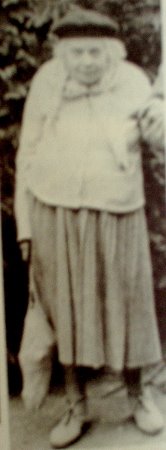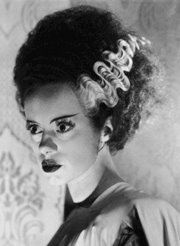The actress Elsa Lanchester's mother was kidnapped, in her early 20's, in late 19th c. London, from the home she shared with her lover, Lanchester's father, because they hadn't been married, and were consequently living in sin. By her own father and her own brother. 
She was taken to a private asylum and held there for more than a day or two, though less than a month. The idea being she was insane, because she was living with Lanchester's father out of wedlock. This idea was corroborated by medical professionals.
They never did get married, though producing Lanchester and her older brother, and living together into their elder years.
Lanchester's most famous role by far was as the eponymous "Bride of Frankenstein".
In the uncut original she plays Mary Shelley on that dark and stormy night with Byron and Percy, as the tale begins.
She was married to Charles Laughton, whose career and fame far overshadowed hers.
Laughton was a relatively discreet homosexual. Their's was an unusual but loving and long relationship.
Laughton's family was Catholic and there was some conflict, as Lanchester records it, at the time of his death about his antipathy toward Catholicism.
The Wikipedia entry for Lanchester seems to have been written by someone still engaged in that conflict.
She was a founder of the Turnabout Theater in LA. (link to LA Pub. Lib. images)
Photographs of her in her autobiography, "Elsa Lanchester, Herself" make it seem likely she was an alcoholic.
As a young woman, before she married Laughton, Lanchester dined with, on separate occasions, Aleister Crowley the famous Satanist and covert operative, and Theo. Herzl, the public founder of present-day Zionism.
The social morality that made it possible, if not imperative, that Lanchester's grandfather "rescue" her mother by force, against her will, from the awful sin of unsanctioned cohabitation, has altered itself.
But there was never a moment of admission of fault, never any shame - just slow change, an evolution toward more enlightened morality, undirected, uncodified, in stark contrast at its extremes, but unnoticeable in the midst of its progression.
This leaves open the possibilty that there are still pathologies in the public moral code.

informant38
-
...But of these sophisms and elenchs of merchandise I skill not...
Milton, Areopagitica
Except he had found the
standing sea-rock that even this last
Temptation breaks on; quieter than death but lovelier; peace
that quiets the desire even of praising it.
Jeffers, Meditation On Saviors
-
21.6.06
Blog Archive
-
▼
2006
(705)
-
▼
June
(76)
- Surprising news:A judge on Friday ordered the arre...
- round and round...he wore a plastic bracelet beari...
- Clarity from the State Dept.:re: Russian diplomats...
- Number:A group of 50 pro-Israel Christian tourists...
- Moscow Blames U.S. for Russian Hostages Death in I...
- "The next president of Mexico won't be the lackey ...
- More war - counterattack:Despite its bluster, main...
- Molly Ivins:"I say no. I say Karl Rove doesn't mak...
- War:The Pentagon's Missile Defense Agency has not ...
- "So the way I read the picture is that Chavez has ...
- "My husband died of AIDS. I knew we should use a t...
- "the prospects for long-term energy production in ...
- "People are just kind of weird with water"
- Dept. of Unconscious Plagiarism: This bit of sarca...
- I know you are, but what am I?Sterling Burnett is ...
- "...on May 26 U.S. Secretary of State Condoleezza ...
- There are now about 200,000 homeless vets in the ...
- -"We have to recognise that some of the climate su...
- Snippets: The long lives that some former cannibal...
- megan's outlaws: Jose Tapia, along with a friend, ...
- "It is the hallowed 'Fallujah' model, intended to ...
- Bush is set to pledge that the United States will ...
- "To clarify this further, this entire area has bee...
- Gay-Affirmative Public School Teachers/Curricula M...
- The actress Elsa Lanchester's mother was kidnapped...
- Three children killed by A Crucial Vote 'Cut and R...
- Crimes Against Nature:Part 2 broadcasts Robert Ken...
- ...the computer-generated record from the Kamal Ad...
- After leading Bush's successful campaign, Allbaugh...
- 23:In this case, that seat was the toilet.
- Pro-whaling Mali and Mongolia have consistently v...
- The Farley Mowat, under the command of Dutch Capta...
- "We know that the humpback has some sort of specia...
- A Break In The Timeline:"My son Nick died in Iraq ...
- A federal judge in Brooklyn has ruled the governme...
- No Irony!Bush creates huge aquatic Eden!
- Profane or sexual:President Bush Thursday signed a...
- "If not for America, who would rally likeminded co...
- ...55mm
- no pattern emerges:In the last couple of weeks the...
- Serge July, the CEO and founder [with existentiali...
- Left I on the News has a pretty clear and very rea...
- Meanwhile, Israeli Defense Minister Amir Peretz ha...
- The disaster robbed China of 35 of its best electr...
- "I don't want them to be under any inhibition at a...
- "I appreciate the fact you realise the future of y...
- Piecing Together Haditha at Obsidian Wings
- you're never going to go home
- Staging:"This illustrates to me the true nature of...
- Alberto the wake-up call
- In the very simple mind of the very large thing in...
- Leverage xenophobia responseGoff on al-Zarqawi
- Compare and contrast:Blow by Blow - As American as...
- Nothing up my sleeve. Presto! No doubt about it, I...
- "Victory diminishes the significance of war crimes...
- Swords into ploughsharesploughshares into thin air...
- "There were problems in Kilo company with drugs, a...
- CNS: Creationism is not considered a science becau...
- The dead from Hiroshima and Nagasaki wish to obje...
- "I argue that the Bush Administration's path to ma...
- core values trainingRichard Marsden on Bush, Niet...
- "Until that moment, I'd never heard those three wo...
- Mark Leibovich has a lengthy hit piece on Nancy Pe...
- "All the victims had gunshot wounds to the head"Wa...
- link fixed! Children in the news every day:"These ...
- Diamonds:"We have heard that you are very interest...
- China: In its Quadrennial Defense Review, publishe...
- China China China:The union representing journalis...
- And God said, Let us make man in our image, after ...
- Waking the kids back up:A meteor's roaring crash i...
- Water Pyramids-link RN
- power over those with no recourse:Shaul talks abou...
- A concerted effort to get the children to go back ...
- Because he was there:"You have to sacrifice a few ...
- "The American people admire the Rwandan people for...
- Turgid, purple, ranting, venting:An essay, in whic...
-
▼
June
(76)
